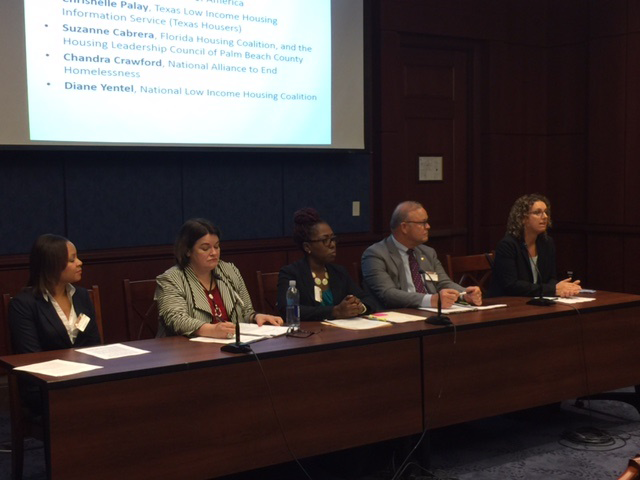Disaster Recovery: A New Coalition Calls for Proven Solutions
Mar 23, 2018
Disaster recovery creates an opportunity for a community to rebuild better with the use of federal Community Development Block Grants—Disaster Recovery (CDBG-DR) funds to address long-time housing challenges. Doing this requires the direct engagement of community leaders in the process of getting those resources and using them where they are needed most. Soon after Hurricane Harvey hit Texas and Hurricanes Irma and Maria both struck Florida and Puerto Rico, the National Low Income Housing Coalition (NLIHC) mobilized to establish and coordinate the Disaster Housing Recovery Coalition (DHRC). The DHRC is a group of more than 700 local, state, and national nonprofits and government agencies.
 Advocates from Florida and Texas join national leaders to brief Congressional staffers
Advocates from Florida and Texas join national leaders to brief Congressional stafferson housing needs after the damaging hurricanes of 2017
The goal of the DHRC is to work collectively to ensure federal disaster recovery resources for housing reach impacted households with the lowest incomes. NLIHC convenes national conference calls for the rapid exchange of information between community leaders and advocates in Washington. Together, advocates participating in the DHRC have monitored and weighed in with Congress about first-hand experiences in the disaster zones and resources needed to get our communities back on their feet. Over 50 organizations from Texas, Florida, Puerto Rico, and California are represented in the coalition and provide updates on the regular calls. Email updates on the actions of FEMA, HUD, USDA, IRS and other federal agencies go out several times each week to all DHRC Members.
NLIHC recently brought a select group of leaders from our partner organizations in the multiple disaster areas to Washington for two congressional staff briefings at the Capitol. Each leader shared the conditions back home and addressed questions around their respective recovery efforts. While in DC, they also had direct meetings with key congressional offices and HUD Deputy Secretary Pam Patenaude. These visits also introduced the state and local leaders to national media and congressional staff for continued communication upon their return home.
A key policy priority of the DHRC is the urgent need for the Disaster Housing Assistance Program (DHAP), which has successfully provided housing solutions after previous hurricanes. The DHRC has called on FEMA, HUD, and Congress to launch DHAP. The coalition also sent sign-on letters to the governors of Texas, Florida, and Puerto Rico encouraging them to request DHAP housing assistance. Local advocates from the DHRC joined with NLIHC on recent op-ed pieces in the Orlando Sentinel and Austin American-Statesmen.
Congress has now passed three disaster recovery bills to funnel billions of public funds into the disaster-hit communities, so the focus of DHRC efforts is turning to community leaders taking an active role in the state plans required to invest those funds. Texas leaders were the first in putting together a detailed response to its state action plan. The DHRC provided an opportunity for its 700 organizations to sign on to the document that outlines Texas Housers’ civil rights concerns in the state plan. NLIHC helped to secure a meeting for its Texas partners with George P. Bush, the General Land Office commissioner, to raise these concerns directly. Working together, organized efforts in Florida and Puerto Rico can use Texas’s response as a starting point for monitoring and responding to the action plans unfolding in their own communities.
The absence of publicly available data from FEMA has proven to be one of the greatest challenges to ensuring low income households are equitably provided federal disaster assistance for both temporary and long-term housing recovery. This obstacle had been raised by all three working groups recently formed by the DHRC: Data Transparency, Puerto Rico recovery, and Homelessness.
In the end, 2017 delivered an unprecedented number of natural disasters in a very short period of time. By working collaboratively, the DHRC is engaging and mobilizing partner organizations across three states and Puerto Rico to play a pivotal role in bringing housing recovery issues for low income households to the forefront of the federal response.